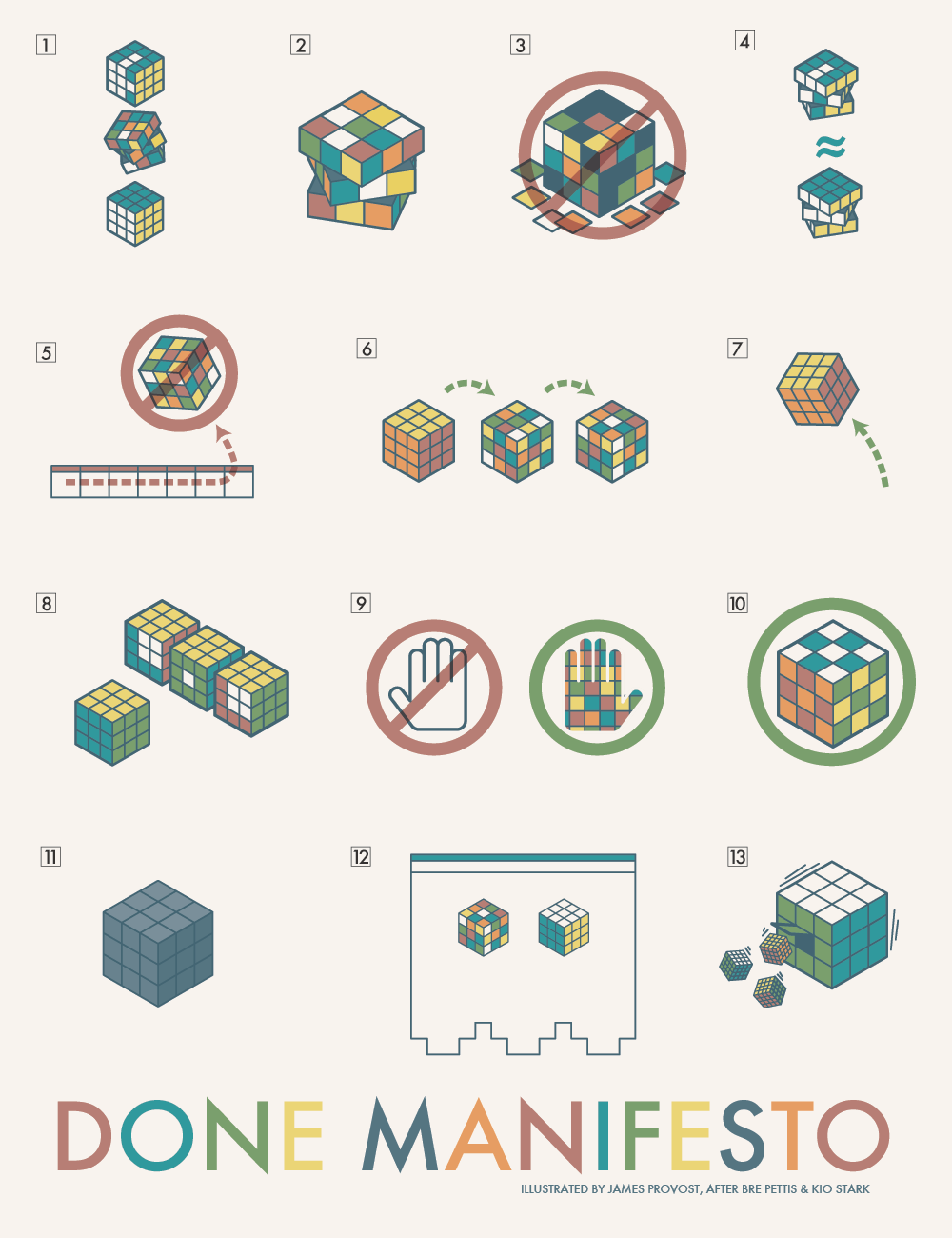How to get things done

Hello, it's Nicolas!
As mentioned in my last article which explained how to cultivate your motivation, this article will deal with "how to get things done".
In 2009, The Cult of Done Manifesto was created by Bre Pettis and Kio Stark in just 20 minutes. This document contains 13 principles that will help you accomplish more and advance in your projects, both personally and professionally.
Is this manifesto perfect? Certainly not. Will it solve all your problems? I don't think so. To its credit, it contains many essential elements and was completed in just 20 minutes. This concentrated set of ideas, produced in a simple document in a few dozen minutes, is the perfect illustration (in my eyes) of what can be achieved when you're productive.
Without further ado, let's look at these 13 principles and how they can be integrated into everyday life.

1) There are three states of being. Not knowing, action and completion.
The first state of being is "not knowing". This points to a task, an idea, or a goal, for example. Something imprecise, where lack of knowledge and doubts mix with curiosity. The second state is "action". This is the process that aims to transcend something from the state of "not knowing" to the third state: "completion".
It is this sequence of elements that allows you to move from a task on your to-do list to something that exists before your eyes.
2) Accept that everything is a draft. It helps to get it done.
Markus Persson, alias Notch, started creating Minecraft (currently the best-selling game in the world) unassumingly. He simply loved producing video games. He built this game, which ended up being globally known, by simply starting with a draft.
Furthermore, he never set out to create Minecraft thinking, "I'm going to create a game where millions of players will play every day!". If he had, Minecraft would never have seen the light of day: this overly ambitious goal compared to what he was actually capable of producing would have destroyed all forms of motivation.
Once again, it's important to always start simple. And what could be simpler than a draft? It's not perfect, but it doesn't have to be, it's just a draft.
3) There is no editing stage.
When you play a musical instrument, there is no editing possible. If you hit the wrong note, it's impossible to press "Ctrl + z" to undo or come back to correct it later.
"When you hit a wrong note, it's the next note that makes it good or bad." Miles Davis
It's therefore important to keep moving forward, even in case of error. It's only what you do next that will determine if you actually made a mistake or not.
4) Pretending you know what you’re doing is almost the same as knowing what you are doing, so just accept that you know what you’re doing even if you don’t and do it.
This phrase can simply be replaced by "fake it until you make it". Knowing exactly what you're doing when you're creating something is quite rare. And it's even rarer (or impossible) when you're doing something new. If you don't know exactly what you're doing, it's not a big deal. You might take a little more time and make some mistakes along the way, but you'll eventually reach the state of "completion", and that's what matters most.
5) Banish procrastination. If you wait more than a week to get an idea done, abandon it.
This principle might seem a bit extreme. For me, it certainly is! Sometimes we're buried under a mountain of urgent tasks, and there's no way to free up time to tackle this new idea. Does that mean the idea is destined for the rubbish? I don't think so.
However, this principle remains relevant. We always have tasks that we keep pushing back week after week. If an idea keeps getting pushed back, it's not important or urgent enough to deal with. We can replace this principle with: if you postpone the execution of an idea two (or three) times, abandon it.
6) The point of being done is not to finish but to get other things done.
This principle echoes principle #2, where everything is a draft. Finishing something is mechanically impossible: it would mean it's perfect. But nothing is perfect.
When a author writes a book, they don't publish it once the book is finished; they publish it when they've worked on it enough and the quality is (in their opinion) up to par. The writer is obliged to publish the book in progress (or consider it done) to move on to the next one. Otherwise, they can't advance, either as an artist or as a human.
7) Once you’re done, you can throw it away.
Once something is done, you can get rid of it, it's done.
Once you've completed a musical, physical, or other performance, there's no point in thinking about it any more, it's done. What matters is to overcome your fears and limits when necessary, only what happens during said performance counts. After that, you can just throw it away, it doesn't matter anymore.
8) Laugh at perfection. It’s boring and keeps you from being done.
Perfectionism will keep adding little elements to a project (which in 99% of cases don't add any real value). This perpetually keeps us away from the state of completion. Every step we take to get closer moves us one step further away.
Perfection is like a rainbow. It's beautiful when you're far away, but it's impossible to touch.
9) People without dirty hands are wrong. Doing something makes you right.
There's a saying where I come from: "You become a blacksmith by forging." There's no other way to progress and gain competence than by doing things with your hands.
You probably wouldn't think of explaining to Michael Phelps how to swim. The more you do something, the more you excel in that field, and the more you're able to accomplish tasks in it.
10) Failure counts as done. So make mistakes.
You don't learn to walk without stumbling. You don't learn to run without falling. The only way to move forward, to progress, and to get things done is to try. And in trying, you inevitably make mistakes. That's normal, we're human!
"A person who has never made a mistake has never tried to innovate." Albert Einstein
If you want to get things done, you have to make mistakes. Each mistake you make allows you to move something from the state of "not knowing" to the state of "completion".
11) Destruction is a variant of done.
This one is straightforward. Once it's destroyed, it's done, you can move on.
12) If you have an idea and publish it on the internet, that counts as a ghost of done.
You can't fulfil all your (good) ideas. Or if you do, let me know in the comments how you manage it, I'm interested! However, if you share your idea with someone who ends up realizing it, you've contributed in your own way.
If you had the idea and shared it, you've done your job. Let others do theirs.
13) Done is the engine of more.
Once you've done something, you can move on to the next thing. Once the writer is done with their book, they can move on to the next one. Once the musician finishes their piece, they can move on to the next one.
A huge thank you to the YouTuber No Boilerplate, who introduced me to this framework a year ago and dramatically changed my perspective on productivity. I hope, dear reader, that I have brought you as much as he brought me. Feel free to use the comment section to share your thoughts!





